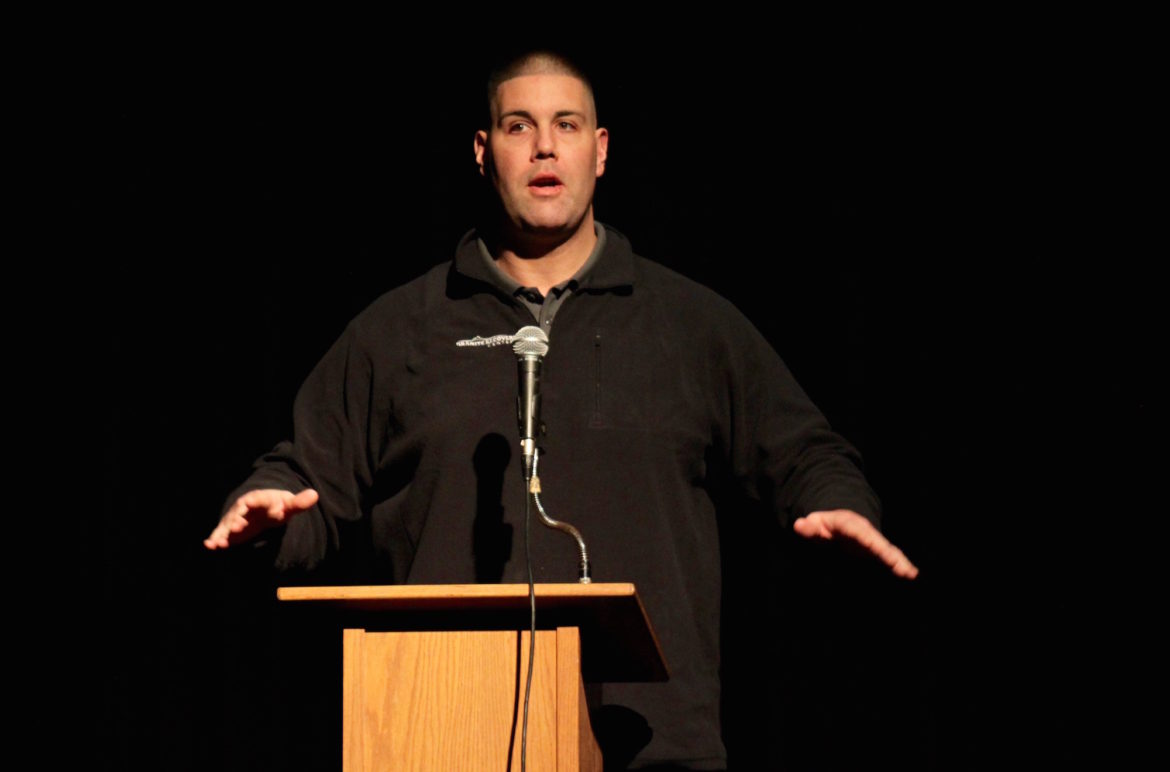
Charlie Breitrose
Congresswoman Katherine Clark spoke about what Congress is doing to stop the the opioid epidemic facing Massachusetts and the rest of the country at the Erase the Stigma event at Watertown Middle School.
The effort to stop the epidemic of opioid and heroin addiction across the country has led to some strange allies, Congresswoman Katherine Clark said Thursday night, but local efforts like the one in Watertown are just as important as bills passed in Washington.
Clark spoke at Watertown Middle School during the Erase the Stigma event hosted by W.A.T.E.R.town (Watertown Access to Treatment, Educations and Resources) Task Force on Substance Use Disorder.
Addiction to opiates, which often begins with using prescription painkillers, has touched all demographics, Clark said, and even the youngest.
“At Melrose-Wakefield Hospital, a small community hospital, 5 percent of the babies born are dependent (on opiates),” Clark said.
This led her to sponsor legislation to to help opioid-exposed infants in 2015, and she got some help from across the aisle.
“The co-sponsor was (Senate Majority Leader and Republican) Mitch McConnell,” Clark said. “Not any people saw that coming. But he knew Kentucky was just as impacted as Massachusetts.”
The bill passed, as did others that took steps to cut the amount of unused painkillers by allowing pharmacists to partially fill prescriptions, and another increased the access to the anti-opiate overdose drug, Narcan.
One thing missing from these bills, Clark said, was funding to fight the opioid epidemic, but another bill, the 21st Century Cures Act, includes $1 billion in funding. It passed the House and now is in front of the Senate.
Locally, Clark said Watertown has the right approach to dealing with opioids.
“Look at the Watertown Police Department. They know we can’t arrest our way out of this,” Clark said. “We need to cut off access to black market drugs and we also need to treat this as a disease.”

Charlie Breitrose
Former NFL player Jeff Hatch got addicted to opiates after suffering an injury. Now in recovery, he speaks about his experience and trying to get others into treatment.
Addiction can impact everyone, even those who check all the boxes for what is considered a success in today’s society. Former NFL player Jeff Hatch talked about how he had troubles with addiction in college and as a professional athlete, and how people allowed it to go on.
“They coddled me …,” Hatch said. “I wasn’t confronted because of my ability to play football.”
After graduating from University of Pennsylvania as an All-American offensive lineman, he was drafted by the New York Giants. Despite playing pro football, having his own townhouse and a Lincoln Navigator with 24-inch rims, Hatch said he was not happy.
During his first season he suffered a back injury and was prescribed painkillers that contained opiates.
“I discovered If I took a certain amount of the medication it would cure my physical pain, and if I took a few more it would make my emotional problems go away,” Hatch said
After three years with the Giants, he was sent to the Tampa Bay Buccaneers, where he re-injured his back, and this time it was a career-ending injury. Hatch continued to use pills, and he recalled on the day of the Super Bowl, four years after being drafted, he overdosed. He was found and went to hospital, where a doctor recommended a treatment center in Monroe, Louisiana.
He planned to spend only a couple weeks, but another patient who had been there longer than Hatch said he felt something good, something different, and encouraged him to stay. He did and on the 42nd day there, Hatch decided he no longer wanted to be a person addicted to drugs, and needed to do something else.
That turned out to be working at video store, which turned out to be a great move.
“I got humility in my life,” Hatch said. “It was a great job. I cared. I know every movie in the store and I wanted to sell the most memberships cards.”
Hatch then was asked to help spread the word of the treatment center and his experience, and now works as a marketing representative for The Granite House, a men’s extended care program in Derry, N.H.
The audience also heard from Dr. Laura Kehoe, a Watertown resident who works at Mass. General Hospital, who talked about the impact of opioids on the brain, particularly with children and teens.
Those who start using as a teen are more likely to become addicted, Kehoe said, and will do harm their brain development.
She recommended that parents speak with their children about the dangers of drugs of all kinds and alcohol and that they disapprove of them using them.
“It may not seem like kids hear you, but they are listening,” Kehoe said. “Kids whose parents talk to them are 50 percent less likely to use alcohol and drugs.”
Watertown mother Rhonda Lotti has two daughters who became addicted to opiates and she lost one just when she thought she had become sober. She now works with Magnolia New Beginnings that supports those who are addicted and their families as they seek recovery and raise awareness about addiction.
Lotti said she tried everything from yelling at them to grounding them to having them arrested. Having lost one daughter, and the other now in recovery, she now has another approach.
“I tell her she is loved beyond measure,” Lotti said.